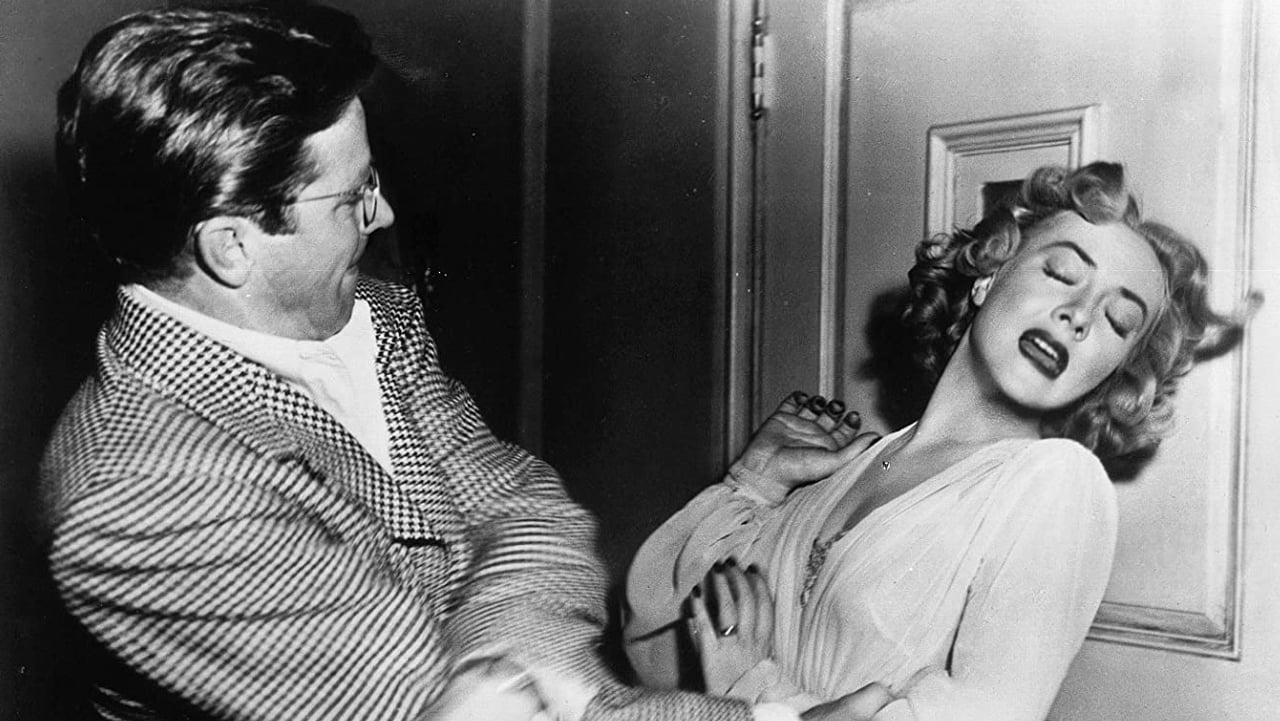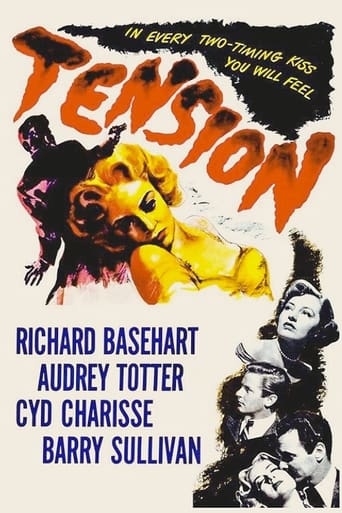Glimmerubro
It is not deep, but it is fun to watch. It does have a bit more of an edge to it than other similar films.
Livestonth
I am only giving this movie a 1 for the great cast, though I can't imagine what any of them were thinking. This movie was horrible
Teddie Blake
The movie turns out to be a little better than the average. Starting from a romantic formula often seen in the cinema, it ends in the most predictable (and somewhat bland) way.
Kien Navarro
Exactly the movie you think it is, but not the movie you want it to be.
bkoganbing
Tension is neat little noir thriller from MGM where some of their second line players get a chance to show their stuff without any of the big marquee names to
take the audience's attention.Richard Basehart stars as a meek pharmacist whose wife Audrey Totter has been
seeing loudmouthed liquor salesman Lloyd Gough and she's not even keeping it
a secret. After Basehart gets slapped around he conceives of a plan to murder
Gough involving hthe creation of a second identity. But then at the last minute Basehart can't go through with it. In my favorite scene in the film he
tells Gough you can have the tramp, she's your problem now.But then Gough is killed and the cops Barry Sullivan and William Conrad go
looking for the man who doesn't really exist. More I cannot say this one has
more twists than your small intestine.Totter is one nasty slattern of a woman. In contrast to neighbor Cyd Charisse
who Basehart has fallen for. But at the moment he and Totter are trapped by
circumstances.Even the detectives aren't quite what they seem. Barry Sullivan has some unique investigative methods that I'm sure the LAPD would not approve of.You'll like how this one goes down. I'd check it out.
treywillwest
This represents a cross between two distinct, though often confused genres: Film Noir and the crime film. Both deal with the seedy side of urbanity in post-war America, but Noir is about criminals. Such films examine the ways that the unspoken angst of the era led "normal" citizens to do very anti-social things. The crime film, also popular at the time, was about law enforcement and the process by which it rooted out and punished transgressors.
This film is ultimately more of the latter. Although he is not on screen much, the cop who delivers justice and, above all, truth is here actually the main protagonist.
However, the cop character remains a voice-over narrator long enough for the film to seem like it's about characters planning a murder, and it must be said that the narrative is unpredictable and entertaining.
However, this fusion of the two genres ultimately brings out the worst of both their ideological tendencies: the misogyny of Noir, with the authority-worship of the Crime Film.
Alex da Silva
Pharmacist Richard Basehart (Mr Quimby) loves his wife Audrey Totter (Mrs Quimby). However, these feelings aren't reciprocated and Totter spends most evenings with other men behind Basehart's back. He discovers what she is up to one evening but it is all too late and Totter moves into salesman Lloyd Gough's (Barney) Malibu beach house. Basehart suffers a further humiliation when he shows up to confront the couple and this leads him to plan his revenge of murder. He adopts a new identity and prepares to kill Gough. We do indeed get a murder.Basehart, Totter and Gough are all excellent in this film. Detective Barry Sullivan (Bonnabel) looks like Franchot Tone and narrates in parts. The story is effectively told and it is easy to follow. I'm not sure that there is much tension in this offering other than the moment one night when Basehart breaks into Gough's apartment and finds him asleep on a sofa. Will he kill him or won't he? What happens next provides the first surprise of the film before Sullivan's detective appears on the scene and starts playing characters against each other in order to discover what has been going on.It is made pretty clear that Sullivan is in control of what he is doing and there seem to be no surprises for him. What is more interesting is following the double life that Basehart has been leading and egging him on to get away with things. No-one falls for his trick of replacing his glasses and wearing contact lenses in order to disguise his appearance. How dumb to even suggest that he looks like a different person without at least sticking on a false moustache as well. The tension comes from Sullivan cranking up the deceptions in order to trip up the killer but it seems like he knows everything already. No tension. The guilty party is going to get caught. This is an easy-to-watch film with great dialogue delivery from Totter. She is quality in every scene that she is in, and Basehart is a likable chap to root for. As a teenager I had a friend whose house I visited a handful of times. Every time I went round to see him, his schizophrenic mother used to chat to me in the kitchen about how THEY replace the radiators in the house every time she goes out. After watching this film, I now believe her and I think I know who did it. As my wife is not in at the moment, I think I'll just go and replace all the furniture in the flat. Ha ha.
MartinHafer
TENSION is one of those examples of Film Noir that is very good, but just barely misses the mark. In other words, with a slight rewrite on the script, this could have been an exceptional film.I liked this film because some of the "lesser" players at the studios were given a chance to show that they really could act--and act well. Richard Basehart (who is unfortunately rather forgotten today) was an excellent Noir actor, though here he doesn't play the psycho or criminal mind, but a mousy man who is married to pure evil. And, in an excellent job of casting, his sexy but 100% bad wife was played by femme fatale Audrey Totter--one of the best at being bad! I have always liked her and Gloria Graham (who isn't in this picture), as both had a real way of playing trampy and amoral "broads"--the perfect foil for a Noir flick. Additionally, Barry Sullivan and William Conrad (wow, what a voice) were on hand to play excellent cops. Cyd Charisse, though fine in her role, is a "nice person"--therefore, not the most interesting part in such a gritty film.The story begins with Basehart working as a manager and pharmacist at an all-night drug store. The problem is that his wife is like a cat in heat--itching for excitement and not particular who provides it. She spends night after night sneaking out when her husband is working. While he's very meek and filled with denial, eventually he is forced to accept the truth. But, when he confronts the wife and her lover, the lover beats him up while Totter just laughs--nice folks, huh?! In a case of the worm turning, Basehart decides to concoct a complicated scheme for revenge. Because he doesn't want to be caught when he kills the lover (and probably the wife as well), he creates a second identity, "Mr. Sothern". He rents an apartment in that name and spreads his new identity about--and also lets it be known that Sothern wants to kill jerk who beat him up earlier in the film. The plan is for "Sothern" to kill the guy and for all the attention to be focused on him--not Basehart's meek pharmacist. However, the plan changes just before killing the lover--he realizes that the guy deserves what he's got and feels this punishment enough!! And, it appears that Basehart is not wimping out--he just realizes that the jerk isn't worth killing. Later, however, when the jerk IS murdered and the cops naturally assume Sothern did it, this creates a problem--particularly because Basehart didn't do such a great job hiding the trail leading back to him.All in all, it's a pretty interesting film and I liked the plot. However, midway through the film it did something that really irritated me. When the jerk was killed, it was pretty obvious Totter was probably responsible...yet Basehart protected her when the police questioned them. He lied for her and his motivation for doing this wasn't well established. Sure, she threatened to blame her husband but he knew she was a tramp and there were witnesses to her infidelities. So why tell the cops that she was with you all night?! This was a huge plot problem, though fortunately the rest of the film from then on DID come together nicely and more realistically.Overall, not great Noir, but very good Noir and a film that could use a remake to straighten out the plot a bit.

